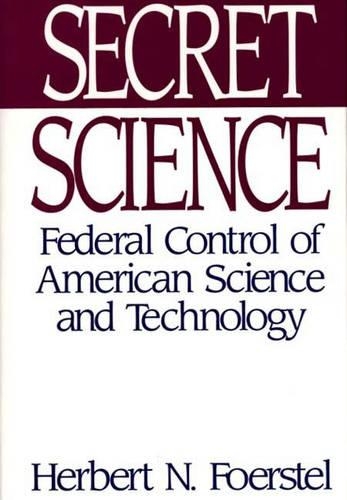
Secret Science: Federal Control of American Science and Technology
(Hardback)
Publishing Details
Secret Science: Federal Control of American Science and Technology
By (Author) Herbert N. Foerstel
Bloomsbury Publishing PLC
Praeger Publishers Inc
30th January 1993
United States
Classifications
Tertiary Education
Non Fiction
Human rights, civil rights
Science funding and policy
Scientific research
Industrial applications of scientific research and technological innovation
353.0085
Physical Properties
Hardback
256
Description
This book is a plea for scientific openness and free access to information. It demonstrates the futility of scientific secrecy and the weakness of national arguments against open communication. From the restriction of technologically advanced exports, to the classification of research as restricted or secret, to the monitoring (and censoring) of scientific publications and library collections, to the pre-emption by the Pentagon of scientific and technological research, the US federal government has achieved a state of unprecedented control over American science and technology - this despite the end of the Cold War. Foerstel examines this continuing trend toward the state as chief sponsor, promoter, and supervisor of scientific research and its unsettling ramifications. Foerstel concludes that scientific secrecy is counterproductive to American interests, particularly in an era when economics has come to define national security. His controversial analysis aims to be of interest to scientists, historians, and students of government alike.
Reviews
A disturbing but interesting book . . . General; undergraduate; graduate; faculty.-Choice
Controversial and thought-provoking but well-supported and convincingly presented. Secret Science offers a fresh perspective on such issues as technology transfer, information control and management, government-industry cooperation and the global marketplace.-Sea Power
Foerstel argues convincingly that federal control of science and technology is both a serious threat to democracy and a profoundly ineffective way to organize the scientific enterprise.-Booklist
Foerstel's Surveillance in the Stacks (1991) was a science librarian's response to the FBI's "Library Awareness Program," in which the feds asked for records of "suspicious" foreign nationals consulting technical reference books. Here, the author expands his scope to examine the broader issue of governmental control of scientific research and publication in a free society . . . compelling for its detailed and extensively documented treatment of the damage done to science in the name of security. Required reading for anyone concerned with continued abuses of power by the military-industrial complex.-Kirkus Reviews
The strength of this book lies in the extensive research that the author has conducted and synthesized. No one has brought the complex web of contemporary American information policy issues together in such an understandable construct. Historians, public policy analysts, archivists, librarians, and records managers seeking to democratize American national information policy need to read this book.-American Archivist
"A disturbing but interesting book . . . General; undergraduate; graduate; faculty."-Choice
"Controversial and thought-provoking but well-supported and convincingly presented. Secret Science offers a fresh perspective on such issues as technology transfer, information control and management, government-industry cooperation and the global marketplace."-Sea Power
"Foerstel argues convincingly that federal control of science and technology is both a serious threat to democracy and a profoundly ineffective way to organize the scientific enterprise."-Booklist
"The strength of this book lies in the extensive research that the author has conducted and synthesized. No one has brought the complex web of contemporary American information policy issues together in such an understandable construct. Historians, public policy analysts, archivists, librarians, and records managers seeking to democratize American national information policy need to read this book."-American Archivist
"Foerstel's Surveillance in the Stacks (1991) was a science librarian's response to the FBI's "Library Awareness Program," in which the feds asked for records of "suspicious" foreign nationals consulting technical reference books. Here, the author expands his scope to examine the broader issue of governmental control of scientific research and publication in a free society . . . compelling for its detailed and extensively documented treatment of the damage done to science in the name of security. Required reading for anyone concerned with continued abuses of power by the military-industrial complex."-Kirkus Reviews
Author Bio
HERBERT N. FOERSTEL is Head of Branch Libraries and Head of the Engineering & Physical Sciences Library at the University of Maryland. He holds degrees from Hamilton College, Rutgers University, and Johns Hopkins University and is the author of Surveillance in the Stacks: The FBI's Library Awareness Program (Greenwood, 1991).
